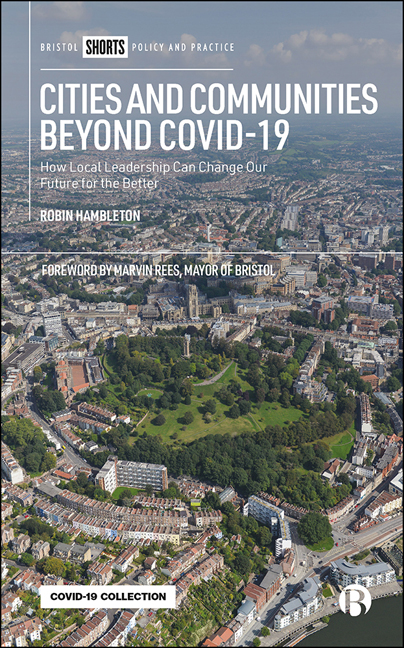Book contents
- Frontmatter
- Contents
- Lists of Figures, Tables and ‘Innovation Cameos’
- About the Author
- Acknowledgements
- Foreword
- One No Going Back
- Two The COVID-19 Pandemic
- Three The Central Challenge: Improving Governance
- Four The New Civic Leadership
- Five The Bristol One City Approach
- Six Enhancing the International Conversation
- Seven Lesson Drawing for the Future
- Index
Six - Enhancing the International Conversation
Published online by Cambridge University Press: 12 March 2021
- Frontmatter
- Contents
- Lists of Figures, Tables and ‘Innovation Cameos’
- About the Author
- Acknowledgements
- Foreword
- One No Going Back
- Two The COVID-19 Pandemic
- Three The Central Challenge: Improving Governance
- Four The New Civic Leadership
- Five The Bristol One City Approach
- Six Enhancing the International Conversation
- Seven Lesson Drawing for the Future
- Index
Summary
Introduction
The COVID-19 pandemic presents a global challenge and it follows that an effective societal response must involve international collaboration.
In Chapter Three, I expressed concern about the way national governments are not, as yet, working that well together. Indeed, there has been a troubling growth in nationalism in recent years, and this makes the vital work of very important international bodies, such as the UN and the WHO, all the more difficult. In this chapter, we will explore the growth of international networking by sub-national units of government. At this level of governance, the outlook for fruitful international exchange and collaboration is altogether brighter.
Benjamin Barber advanced the view that city mayors, singly or jointly, are more capable of responding to transnational challenges than nation states, mainly because they are not mired in ideological infighting and sovereign rivalries. Indeed, he argued that the nation state is failing us on a global scale, not least because it is utterly unsuited to interdependence. The way that politicians leading nation states are finding it so difficult to work together in responding to the COVID-19 pandemic lends support to Barber's analysis. It could well be that, as Barber argues, in today's globalizing world the city has become democracy's best hope.
The focus of this chapter is, then, on international dialogue below the level of the nation state. There has, in fact, been a spectacular rise in international city-to-city learning and exchange, and this multifaceted process is leading to widespread innovation in collaborative governance, citizen empowerment and community leadership. The presentation unfolds in three steps.
First, the reasons why cities and localities engage in international exchange are set out, and the potential of cross-border lesson drawing for improving public policy and societal innovation is highlighted. Reference is made to some of the many international local government and city networks that now play an increasingly important role in assisting place-to-place dialogue and learning.
The second section provides the heart of this chapter. It presents short ‘innovation cameos’ of five cities drawn from five different countries, to illustrate the way in which placebased leaders in specific localities are, right now, developing imaginative responses to the complex challenges facing us.
- Type
- Chapter
- Information
- Cities and Communities Beyond COVID-19How Local Leadership Can Change Our Future for the Better, pp. 133 - 152Publisher: Bristol University PressPrint publication year: 2020



